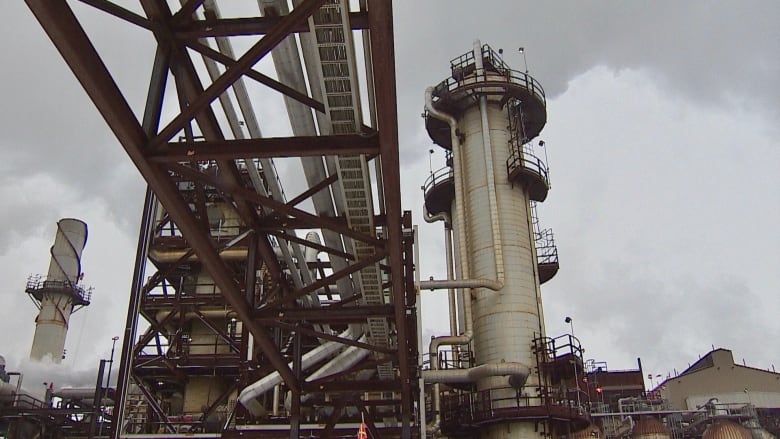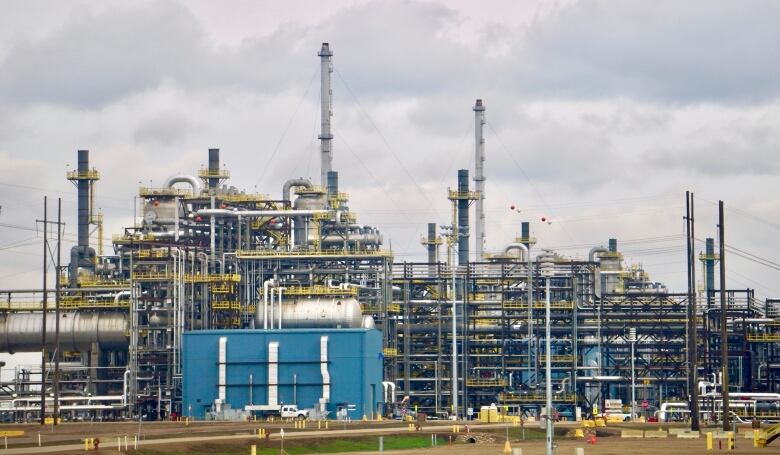ANALYSIS | In race to replace Alberta Premier Jason Kenney, UCP candidates weary of cutting emissions | CBC News
To hear some of the candidates seeking to become the leader of Alberta’s governing UCP — and the province’s next premier — one would think the oil and gas industry was in the doldrums, struggling to make a buck.
In fact, Canada’s oilpatch is enjoying its most lucrative year on record. Its profits have been described as a broken cash machine, as the largest companies collect billions in profit every few months.
Still, one major challenge hasn’t gone away: finding a way to lure back the global banks, insurance firms, and investors that don’t want to be associated with an industry — particularly the oilsands — that’s become a target in the global climate crisis. It’s one reason why the biggest oilsands producers have made pledges to wipe out their greenhouse gas emissions by 2050 (a pledge a number of environmental groups find dubious).
But while big oilsands players are busy talking up their efforts to slash emissions, on the campaign trail for the UCP, there is little focus on the environment, let alone acknowledging global warming or climate change.
No more net-zero talk
In the party’s first official leadership debate, candidate Danielle Smith said Alberta could achieve the goal of reaching net-zero emissions by 2050, a target that the federal government has set, as have many private sector companies, including the large oilpatch players. Her opponents were quick to pounce.
Smith, whose campaign centrepiece is an act she says would allow Alberta to decline to enforce any federal law, was actually attacked for supporting the federal Liberal government and promoting an idea that one candidate said would bankrupt the province.
Candidate Todd Loewen, who has largely been aligned with Smith, was adamant he didn’t even want to talk about net zero and give any more oxygen to the discussion.
“It’s all bull. It’s all B.S.,” he said, during a debate last month. “We need to quit talking about these money-wasting ideas. There’s nothing good that will come with those things.”
Smith hasn’t mentioned “net-zero” since. Her original comments were about how the province could reach the climate target through developing a hydrogen industry and growing the number of carbon capture and storage projects in Alberta.
On the topic of the environment, her focus has been on how Canada should export more natural gas internationally to displace coal and other heavy-emitting sources of energy, while advocating for more pipelines and growing oil and natural gas production.
“Talking about phasing out bitumen is as dumb as talking about phasing out cement or phasing out steel,” she said, during a subsequent debate.
Smith’s stance is noteworthy considering experts say her insistence that the science behind climate change hadn’t yet been settled was one reason she lost the 2012 provincial election as the then-leader of the Wildrose.

Candidates emphasize need for more pipelines
More pipelines is a common point of emphasis from candidates, especially to transport natural gas to what they hope will be more export terminals on any coastline, whether that’s in the east, west, or even the north. Advocating for more refineries and pledging cheaper fuel at the pumps, too.
On this campaign trail, there is a recurring theme when discussing the environment: let’s pump more oil and natural gas out of the ground.
“We need to make sure that we empower our industries to be the best in the world, which they are right now, but then to get our oil to everyone,” said candidate Brian Jean, during a debate last month.
Best-in-class can be measured in different ways, but when it comes to climate change, the oilsands sector as a whole is still a heavy source of greenhouse gas emissions compared to oil produced elsewhere in the world.
Some candidates lament how some pipelines proposals in the past decade failed and point the finger at the federal government. They are also concerned about how some federal policies could impact the oilpatch, such as the proposed cap on emissions.
“We’ve seen a federal government that’s not just tried to destroy our oil and gas industry. They’re actually destroying it right now,” said Loewen.
It’s a peculiar way for a politician to describe an industry enjoying record revenue this year.
Plenty of profit in the ‘patch
The oilpatch would surely welcome and support some of these campaign pledges, even though in reality, it’s not in desperate need of a helping hand from a production perspective.
In fact, oil production in Alberta is at a record high, there is spare crude export pipeline capacity and the industry’s financial performance is the envy of the Canadian economy.
Construction on the federally-owned Trans Mountain pipeline expansion is more than 50 per cent complete.
There also isn’t a big push by oil companies to build new large projects, whether that’s in the oilsands or elsewhere in the province as they pay down debt and filter the profits to investors.
On the natural gas front, there are some challenges as export pipelines are maxed-out. A few LNG export facilities are under construction in British Columbia, which will provide a shot in the arm for the sector.
The global energy crisis has caused natural gas prices to spike and has many experts (and companies) believing the commodity has potential for growth. Alberta has plenty of natural gas, but the province has limited ability to grow exports as it needs the co-operation of other provinces and the federal government to build more pipelines and export facilities.

Smith’s Sovereignty Act proposal criticized
While there is finger-pointing at the federal government, there is also criticism about whether one candidate’s policies could also indirectly hurt the oilpatch.
Smith is proposing a Sovereignty Act, which would allow Alberta to decline to enforce any federal law or court decision it decides is counter to the province’s interests.
Some candidates have raised objections, in part because of the uncertainty it could cause investors if the rule of law is not enforced.
“It will create chaos within this business environment. It will send tens of billions of dollars packing out of this province. It will undo all of the gains that we’ve made in the last three years,” said candidate Travis Toews, who was Alberta’s finance minister before the campaign began.
Smith has maintained her proposed policy would actually encourage more investment, although business groups disagree.
Alberta Energy Minister Sonya Savage said in a recent Edmonton Journal column that the proposed act could be as harmful to Alberta’s future as Trudeau’s policies have been to the province’s past.
She noted that international investors concerned about their Alberta assets had been asking her about the Sovereignty Act.
Alberta’s behind-the-scenes action on emissions
The world’s top body of climate scientists has warned about consequences of inaction if countries continue to fall short of their climate targets, as the planet is already experiencing a measurable increase in disasters such flash floods, prolonged droughts, more intense hurricanes and longer-burning wildfires.
In recent years, the UCP government has often clashed with environmental groups and bashed the federal government over climate change, but behind the scenes it has taken many steps to reduce emissions, said Duane Bratt, political science professor at Mount Royal University in Calgary.
The UCP government, under Premier Jason Kenney, has spent money promoting growth of the carbon capture and storage, hydrogen, and petrochemical industries, while working with Ottawa on policies such as reducing methane emissions.
The UCP also continues to have a carbon tax on emissions-heavy industries in the province.
“The government has actually been doing work on climate issues, but privately,” said Bratt, in an interview.
“I call it ‘public Kenney versus private Kenney,’ ” he said.

Ignoring issue won’t make it go away
With any election, there’s always a degree of uncertainty about how any of the candidates would actually govern.
That’s especially true in this type of campaign where UCP members are choosing their new leader and premier. The candidates are specifically tailoring their message to their own party members, not the general population.
There is very little focus on environmental issues by those hoping to govern the province and an absence of even acknowledging the emissions problem the industry is trying to overcome.
There is a push by many countries around the globe to increase oil and natural gas production to lower prices, combat inflation and ensure enough energy to heat homes through the winter in parts of Europe.
Still, if the oilpatch has a need for a helping hand, it’s on climate issues, such as researching new technologies and working with industry to reduce environmental impacts.
In recent years, oilpatch representatives have described how the industry has undergone a sea change in its understanding of the climate change issue, with many companies making net-zero commitments and investing in everything from hydrogen to carbon capture and storage to wind power.
Instead of feeling trepidation over the climate change issue, some companies are looking for opportunities in the transition to lower-emitting sources of energy.
In recent weeks, while the leadership candidates shy away from climate change during public debates and forums, a group representing large oilsands companies is running advertisements stating: “Let’s clear the air: Oil sands are a significant contributor of carbon emissions in Canada.”
It seems it’s the industry wanting to discuss the issue more than the politicians vying for the top political job in the province.
For all the latest business News Click Here

